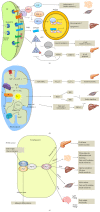The Role of Organelle Stresses in Diabetes Mellitus and Obesity: Implication for Treatment
- PMID: 26613076
- PMCID: PMC4646985
- DOI: 10.1155/2015/972891
The Role of Organelle Stresses in Diabetes Mellitus and Obesity: Implication for Treatment
Abstract
The type 2 diabetes pandemic in recent decades is a huge global health threat. This pandemic is primarily attributed to the surplus of nutrients and the increased prevalence of obesity worldwide. In contrast, calorie restriction and weight reduction can drastically prevent type 2 diabetes, indicating a central role of nutrient excess in the development of diabetes. Recently, the molecular links between excessive nutrients, organelle stress, and development of metabolic disease have been extensively studied. Specifically, excessive nutrients trigger endoplasmic reticulum stress and increase the production of mitochondrial reactive oxygen species, leading to activation of stress signaling pathway, inflammatory response, lipogenesis, and pancreatic beta-cell death. Autophagy is required for clearance of hepatic lipid clearance, alleviation of pancreatic beta-cell stress, and white adipocyte differentiation. ROS scavengers, chemical chaperones, and autophagy activators have demonstrated promising effects for the treatment of insulin resistance and diabetes in preclinical models. Further results from clinical trials are eagerly awaited.
Figures


Similar articles
-
Autophagy and Mitochondria in Obesity and Type 2 Diabetes.Curr Diabetes Rev. 2017;13(4):352-369. doi: 10.2174/1573399812666160217122530. Curr Diabetes Rev. 2017. PMID: 26900135 Review.
-
Role of autophagy in the progression from obesity to diabetes and in the control of energy balance.Arch Pharm Res. 2013 Feb;36(2):223-9. doi: 10.1007/s12272-013-0024-7. Epub 2013 Jan 31. Arch Pharm Res. 2013. PMID: 23371805 Review.
-
The role of autophagy in endoplasmic reticulum stress-induced pancreatic β cell death.Autophagy. 2012 Feb 1;8(2):158-64. doi: 10.4161/auto.8.2.18807. Epub 2012 Feb 1. Autophagy. 2012. PMID: 22258092 Review.
-
Role of islet β cell autophagy in the pathogenesis of diabetes.Trends Endocrinol Metab. 2014 Dec;25(12):620-7. doi: 10.1016/j.tem.2014.08.005. Epub 2014 Sep 18. Trends Endocrinol Metab. 2014. PMID: 25242548 Review.
-
Of the renin-angiotensin system and reactive oxygen species Type 2 diabetes and angiotensin II inhibition.Am J Hypertens. 2005 Jan;18(1):121-8. doi: 10.1016/j.amjhyper.2004.07.001. Am J Hypertens. 2005. PMID: 15691626 Review.
Cited by
-
Obesity Exacerbates Sepsis-Induced Oxidative Damage in Organs.Inflammation. 2016 Dec;39(6):2062-2071. doi: 10.1007/s10753-016-0444-x. Inflammation. 2016. PMID: 27645696
-
An Updated Mini Review of Vitamin D and Obesity: Adipogenesis and Inflammation State.Open Access Maced J Med Sci. 2016 Sep 15;4(3):526-532. doi: 10.3889/oamjms.2016.103. Epub 2016 Sep 6. Open Access Maced J Med Sci. 2016. PMID: 27703587 Free PMC article. Review.
-
Comparison of endoplasmic reticulum stress and mitochondrial biogenesis responses after 12 weeks of treadmill running and ladder climbing exercises in the cardiac muscle of middle-aged obese rats.Braz J Med Biol Res. 2018 Jul 30;51(10):e7508. doi: 10.1590/1414-431X20187508. Braz J Med Biol Res. 2018. PMID: 30066723 Free PMC article.
-
Deciphering the complex interplay of risk factors in type 2 diabetes mellitus: A comprehensive review.Metabol Open. 2024 May 19;22:100287. doi: 10.1016/j.metop.2024.100287. eCollection 2024 Jun. Metabol Open. 2024. PMID: 38818227 Free PMC article. Review.
-
The role of endoplasmic reticulum-mitochondria contact sites in the control of glucose homeostasis: an update.Cell Death Dis. 2018 Mar 9;9(3):388. doi: 10.1038/s41419-018-0416-1. Cell Death Dis. 2018. PMID: 29523782 Free PMC article. Review.
References
Publication types
MeSH terms
LinkOut - more resources
Full Text Sources
Other Literature Sources
Medical

